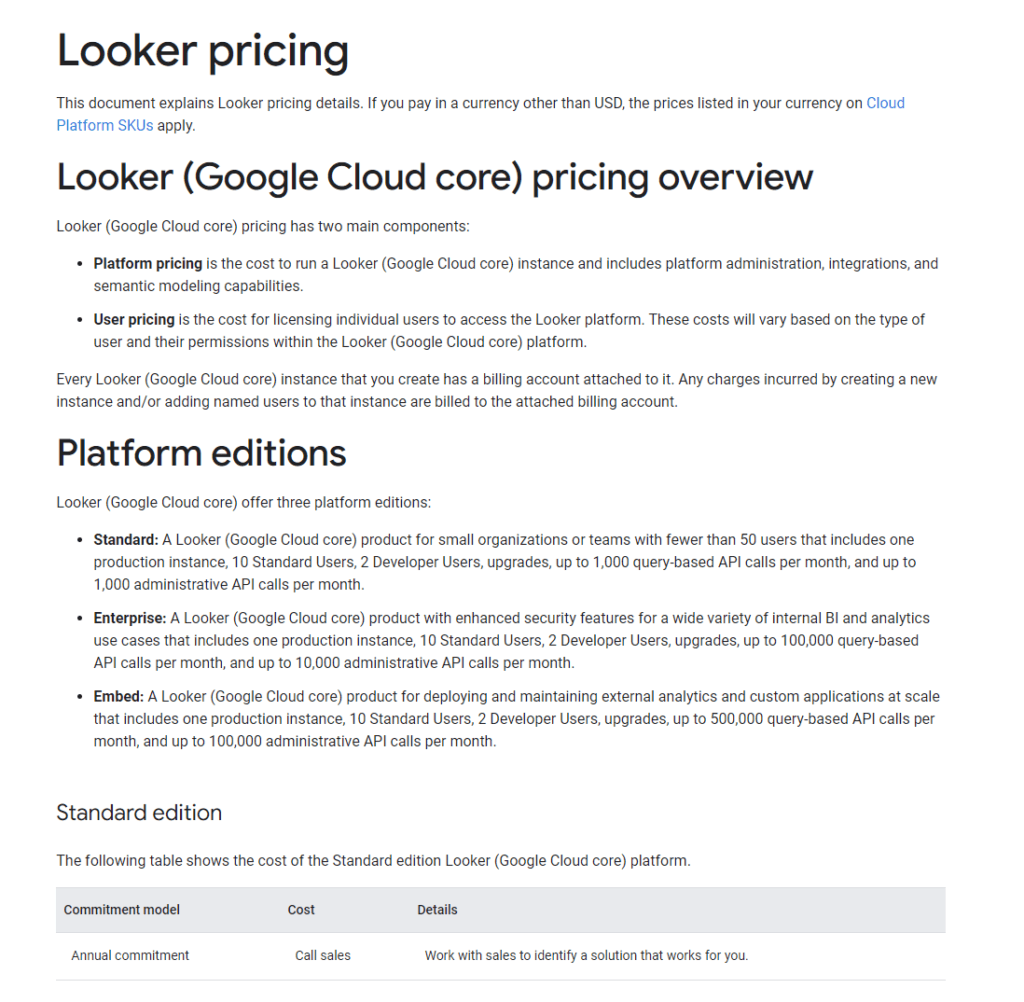In the bustling world of business analytics, making the right choice in analytics tools is akin to selecting a trusted guide for a journey through unknown lands. It’s a decision that can illuminate the path to insights or lead you into a maze of confusion. Today, we find ourselves comparing two notable guides in the analytics realm: MicroStrategy, known for its comprehensive enterprise capabilities, and Looker, celebrated for its modern approach to data exploration and business intelligence. Each tool offers unique strengths, but which one will be the best companion for your data-driven journey? Let’s dive into a critical area of comparison to help chart your course.
| MicroStrategy | Looker |
|---|---|
 |  |
| G2 Score – 4.2 out of 5 stars | G2 Score – 4.4 out of 5 stars |
| TrustRadius Score – 8.4/10 | TrustRadius Score – 8/10 |
Data Integration and Accessibility
The Gateway to Insights
In the realm of analytics, the power to seamlessly integrate various data sources and provide easy access to insights is paramount. Here, we explore how MicroStrategy and Looker handle the crucial task of turning disparate data streams into a coherent, navigable river of information.
MicroStrategy: The Veteran Navigator
MicroStrategy has long stood as a veteran navigator of the business intelligence seas, offering robust data integration capabilities designed to meet the needs of large enterprises. Its platform is a fortress of data integration, supporting a wide array of sources from traditional databases to cloud-based services, ensuring that no data island remains isolated. This comprehensive approach to integration enables organizations to construct a unified view of their operations, laying the groundwork for deep, actionable insights.
The strength of MicroStrategy lies in its ability to not just gather but harmonize diverse data, providing users with a centralized access point to insights across the business landscape. This centralization is crucial for enterprises that operate across multiple domains, requiring a bird’s-eye view to inform strategic decisions. However, the depth of MicroStrategy’s integration capabilities comes with a complexity that demands a certain level of technical savvy to navigate, making it a more suitable choice for organizations with dedicated IT and data analytics teams.
Looker: The Modern Explorer
Looker, on the other hand, takes a more modern approach to data integration and accessibility. Embracing the cloud era with open arms, Looker offers a platform that’s both powerful and user-friendly, designed to make data accessible to users of all levels of expertise. Its integration capabilities are built on the premise of flexibility and adaptability, allowing businesses to connect to their data wherever it resides, be it in the cloud or on-premises.
What sets Looker apart is its innovative modeling language, LookML, which simplifies the process of defining data relationships and transformations. This approach not only facilitates integration but also empowers users to explore data in an intuitive, accessible manner. Looker’s emphasis on user accessibility extends to its dashboard and reporting features, which are crafted to provide clear, interactive insights that drive decision-making. For organizations looking for a balance between powerful data integration and user-friendly analytics, Looker emerges as a compelling choice.
Ease of Use and Learning Curve
The Path to Mastery
In the realm of analytics, the ease with which users can navigate the platform and the steepness of the learning curve to achieve proficiency are pivotal. These factors not only impact the initial adoption but also determine the long-term effectiveness and integration of the analytics tool within an organization’s daily operations.
MicroStrategy: Navigating Complexity
MicroStrategy, with its rich feature set and deep analytical capabilities, is akin to a vast library filled with comprehensive volumes of knowledge. It offers a powerful platform capable of addressing complex business intelligence needs, from detailed reporting to predictive analytics. However, the depth and breadth of its functionalities mean that users often face a steeper learning curve. Mastering MicroStrategy can require significant time and dedication, with a particular emphasis on training for those who wish to unlock its full potential.
The complexity of the platform, while a testament to its capabilities, means that businesses might need to invest in formal training programs or rely on dedicated analysts who specialize in navigating its intricate environment. This investment in learning and development can be considerable but is often justified by the depth of insights and the strategic value that proficient use of MicroStrategy can bring to an organization.
Looker: Streamlining the Analytical Journey
Looker, on the other hand, prioritizes a streamlined user experience designed to lower the barrier to entry for data analytics. Its interface is intuitive, focusing on making data exploration accessible to users of varying technical backgrounds. Looker’s unique approach to data modeling through LookML allows for a more flexible and user-friendly environment where changes and customizations can be made without deep coding knowledge. This approach significantly flattifies the learning curve, enabling a broader segment of the organization to engage with data analytics directly.
The emphasis on accessibility does not mean that Looker compromises on power. The platform still offers sophisticated analytical capabilities, but it does so in a way that is less daunting to non-specialists. For organizations looking to democratize data analytics and empower team members across different functions, Looker presents an attractive option that balances ease of use with analytical depth.
Customization and Flexibility
Tailoring the Tool to Your Needs
In the vast landscape of business analytics, where no two organizations’ needs are exactly alike, the degree to which an analytics platform can be customized and how flexibly it can adapt to various use cases becomes a pivotal factor in its overall utility and effectiveness.
MicroStrategy: The Architect of Analytics Customization
MicroStrategy stands out as an architect in the realm of analytics, offering an extensive suite of customization options that cater to the sophisticated needs of large organizations. With MicroStrategy, businesses are not just adopting an analytics tool; they’re acquiring a comprehensive platform that can be intricately tailored to fit their unique data environments and analytical requirements.
The platform offers deep customization capabilities, from the creation of personalized dashboards and reports to the development of custom analytics applications. MicroStrategy’s ability to integrate seamlessly with a wide range of data sources and its support for extensive API customization make it a powerful choice for organizations looking to build a highly tailored analytics ecosystem. This level of customization requires a certain degree of technical expertise but opens up a realm of possibilities for businesses seeking to leverage analytics as a core pillar of their strategy.
Looker: Flexible Analytics for Agile Organizations
Looker, with its modern approach to data analytics, prioritizes flexibility and adaptability, making it a compelling choice for agile organizations. At the heart of Looker’s flexibility is LookML, its unique modeling language that simplifies the process of defining how data is described, accessed, and transformed. This innovative approach allows for considerable customization within the platform, enabling users to tailor their analytics experiences to their specific needs without extensive technical overhead.
Looker’s platform is designed to adapt swiftly to changing business requirements, supporting a culture of data-driven decision-making across various functions. Whether it’s modifying dashboards to highlight key performance indicators, creating new data models to explore emerging business opportunities, or integrating with new data sources, Looker provides the tools to do so with ease. This flexibility makes Looker an attractive option for businesses that value the ability to quickly pivot and adapt their analytics strategies in response to evolving market conditions.

Related: Check out our free SEO suite

Reporting and Advanced Analytics Features
Beyond the Horizon
The journey of analytics is not confined to understanding what has happened or what is happening—it’s also about peering into the future, predicting outcomes, and making informed decisions that shape that future. Here, we explore how MicroStrategy and Looker equip organizations to embark on this forward-looking voyage.
MicroStrategy: The Oracle of Enterprise Analytics
MicroStrategy serves as an oracle in the realm of analytics, offering a suite of advanced analytics features that go beyond traditional reporting. Its platform is designed for depth, providing users with the tools to conduct sophisticated analyses, including predictive analytics, machine learning models, and complex data visualizations. These features enable organizations to not just react to trends but to anticipate them, crafting strategies that position them ahead of the curve.
The platform’s reporting capabilities are equally robust, allowing for the creation of detailed, customizable reports that can cater to various stakeholders’ needs across the organization. MicroStrategy’s strength lies in its ability to amalgamate comprehensive reporting with advanced analytics, presenting a holistic view of the business landscape that informs strategic decision-making. This combination of depth and breadth in analytics makes MicroStrategy a powerhouse for organizations that require a detailed understanding of their operations and market dynamics to drive growth and innovation.
Looker: The Navigator of Data-Driven Futures
Looker navigates the future with a focus on democratizing data and making advanced analytics accessible to users across an organization. Through its intuitive platform, Looker enables users to generate reports and dashboards that provide clear insights into business performance. Its approach to advanced analytics is centered around making predictive features more accessible, allowing users to explore future scenarios without the need for extensive statistical knowledge.
Looker’s strength in reporting and analytics lies in its ability to empower users to ask and answer their own questions. Through LookML and its interactive dashboards, Looker facilitates a dynamic exploration of data, encouraging a culture of curiosity and data-driven decision-making. This accessibility and ease of use do not come at the expense of power. Looker provides a range of advanced analytics functionalities, designed to fit into the workflows of businesses looking to navigate the complexities of the market with agility and insight.
Data Security and Compliance
Safeguarding Your Data Assets
In the digital age, where data breaches can not only result in significant financial losses but also damage to reputation, the measures an analytics platform employs to protect and secure data assets are of utmost importance.
MicroStrategy: The Bastion of Enterprise Data Security
MicroStrategy, with its longstanding presence in the industry, has cultivated a reputation as a bastion of enterprise data security. It constructs a comprehensive shield around the organization’s data, employing a multi-layered security approach that meticulously guards against internal and external threats. This fortress is not just built with advanced encryption technologies, which secure data both at rest and in transit, but is also reinforced with sophisticated user authentication, authorization, and audit trails that ensure only the right eyes have access to sensitive information.
The platform’s commitment to regulatory compliance is equally impressive, offering a suite of features designed to help organizations navigate the complex labyrinth of data protection laws and regulations across different industries and geographies. From GDPR in Europe to HIPAA in the United States, MicroStrategy provides the tools and controls necessary for organizations to maintain compliance, reduce risk, and foster trust among their stakeholders. This meticulous approach to security and compliance makes MicroStrategy an attractive option for large enterprises that operate in heavily regulated sectors or manage vast amounts of sensitive data.
Looker: Agile Security for the Modern Data Environment
Looker, on the other hand, brings a modern twist to data security and compliance, mirroring its overall approach to data analytics. As a platform that thrives in the cloud, Looker embraces the agility and scalability that cloud environments offer, while also recognizing the paramount importance of securing data and ensuring compliance in these dynamic settings. Looker’s security model is designed to be robust yet flexible, providing strong protections that adapt as quickly as the businesses it serves.
This agility is evident in Looker’s approach to encryption, access controls, and data management, all of which are engineered to offer comprehensive security without hindering the accessibility and flexibility that users love. Looker extends its commitment to security beyond its platform, leveraging the advanced security features of its cloud providers and ensuring that its services are compliant with key industry standards and regulations. For organizations looking for a modern, cloud-native analytics solution that does not compromise on security or compliance, Looker offers an enticing proposition.
Pricing
MicroStrategy

Looker

Conclusion
MicroStrategy has established itself as a comprehensive, enterprise-grade analytics solution, designed for organizations that deal with vast amounts of data across multiple domains. Its robust integration capabilities, extensive customization options, and stringent security measures make it an ideal choice for large enterprises with complex analytics needs and a high priority on data governance.
Looker, on the other hand, emerges as a modern, agile platform that prioritizes flexibility, user-friendliness, and cloud-native innovation. Its approach to data analytics, characterized by intuitive exploration and an adaptable modeling language, is tailored for businesses seeking to democratize data insights across teams. Looker’s streamlined learning curve and dynamic security model offer an attractive solution for organizations aiming for rapid growth and digital transformation.
Read Next:
- The Power of Webinar Funnels in Lead Generation
- How to Utilize Chat and Messaging in Webinar Interaction
- A Deep Dive into Webinar Content Repurposing
- The Role of Webinar Automation in Streamlining Processes
- 31+ Top Social Media Management tools Compared! (2023)






















Comments are closed.